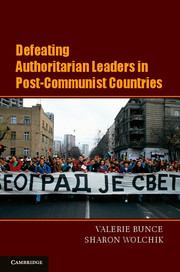1 - Breakthrough Elections
Mixed Regimes, Democracy Assistance, and International Diffusion
Published online by Cambridge University Press: 05 June 2012
Summary
While democracy must be more than free elections … it also cannot be less.
Kofi AnnanEventful temporality recognizes the power of events in history … and events may be defined as that relatively rare sub-class of happenings that significantly transform structures.…
William SewellFrom 1998 to 2005, a wave of electoral defeats of authoritarian leaders swept through postcommunist Europe and Eurasia. This surprising run of opposition victories began with the Slovak election in 1998, when Mikuláš Dzurinda, the candidate of the democratic opposition, succeeded in forming a government and thereby ended the assault on democracy mounted by his predecessor, Vladimír Mečiar. Two years later, the Croatian Democratic Union, which had relied on autocratic methods to govern Croatia since its victory in the first competitive elections held in that country a decade earlier, finally lost power to the democratic opposition. The electoral “virus” then spread to neighboring Serbia. Here, popular protests following the September 2000 election for the Yugoslav presidency forced the long-serving dictator, Slobodan Milošević, to respect the verdict of the voters and transfer power to Vojislav Koštunica, the candidate of the liberal opposition. Georgia in 2003, Ukraine in 2004, and Kyrgyzstan in 2005 then joined the wave of electoral turnovers. All three of these elections featured developments similar to those that had taken place in Serbia – that is, popular protests in reaction to rigged elections and the empowerment of new political leaders and governing parties.
- Type
- Chapter
- Information
- Publisher: Cambridge University PressPrint publication year: 2011

